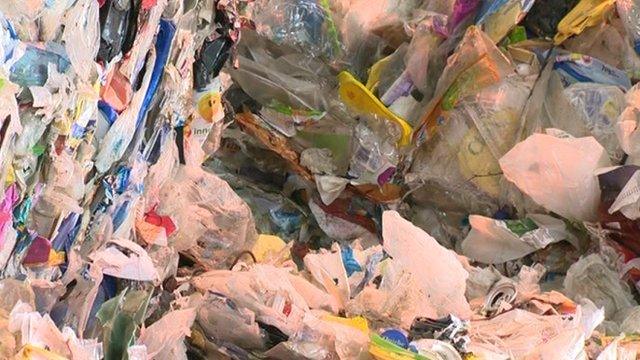Recycling services 'too complicated and confusing'
- Published
Sustainable futures commissioner Peter Davies wants one system of recycling
Household recycling services are too complicated, uneconomic and confusing, a Welsh government adviser has said.
Sustainable futures commissioner Peter Davies wants one system of recycling rather than 22 different ones in each local authority.
Wales recycles more than the rest of the UK but needs to do more to reach the 58% recycling target by next year.
The Welsh government said targets were tough but achievable and was giving £66m to councils to reduce costs.
Councils will face fines of around £100,000 for every 1% they fall short of the target.
Mr Davies told BBC Wales: "We certainly can't have 22 systems. That's far too confusing and uneconomic.
"You're going to get some economies of scale, you're going to be able to get some consistency of messaging and communication across Wales.
"For many people it's the first action we can encourage in respect of becoming more sustainable in their daily lives.
"In Wales, we've done well in meeting our recycling targets and it's one of the areas we're ahead of the rest of the UK.
"There's a real challenge though, in taking it to the next level. You've got to keep it simple and at the minute it is too complicated."
He said in a country of three million people, there was no reason for not having a "one system, co-ordinated approach" which would benefit both householders and retailers.
According to figures for 2012-2013, external, Denbighshire is the only county which would avoid a fine with its current level of recycling at 58%.
Rhondda Cynon Taf had the worst recycling rate of 46.2%.

Case study
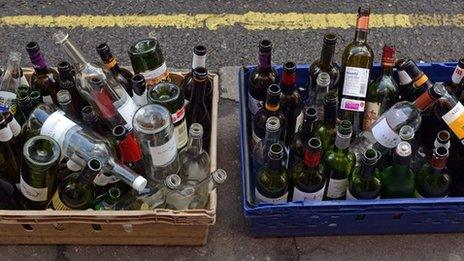
Torfaen county borough is hitting the current target of 52%, but unless it recycles far more will face fines of up to £600,000 next year when the target rises to 58%.
The council is consulting on three options:
Maintain a fortnightly collection with a smaller 140 litre wheelie bin, replacing the 240 litre bins at a cost of £754,000
Fortnightly collection of two refuse bags per household
Monthly collection using existing 240 litre bins
Dedicated nappy collections would be introduced and medical or assisted collections would continue.
Councillor John Cunningham and his wife live in Cwmbran and already have a smaller bin than most. They could regularly go four weeks between black bag collection.
However Lee and Natasha Cuff, who live in New Inn with two young daughters and recycle as much as they can, often find their black bin is full after two weeks.
After advice from the council and being given a food waste bin, they managed to cut down their waste but still could not manage a four-week collection cycle.
They felt more could be done to tell people what could and could not be recycled.

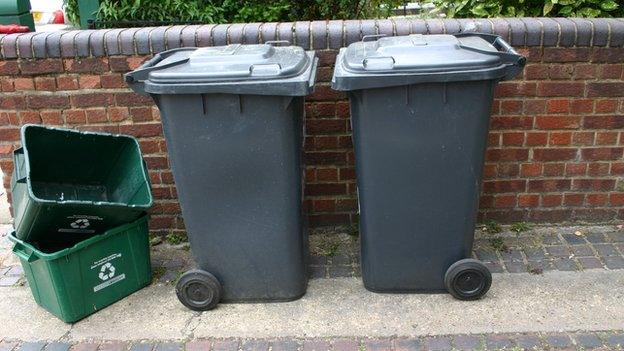
Councils are being forced to think about refuse options
Other authorities are reviewing their options or making changes.
Cardiff has considered monthly collections, see-through bags to highlight those not recycling, smaller bins and lobbying for a "pay as you throw" policy from the Welsh government, meaning the more residents recycle, the less they pay for the service.
Neath Port Talbot has replaced 240 litre bins with 140 litre ones at a cost of £730,000 and Newport is in the process of swapping its bins over.
Swansea is down to three black bags per fortnight while Gwynedd wants to move to collections every three weeks.
Wales recycled 52.3% of its rubbish in 2012-13, ahead of England on 42% and Scotland on 41.2%, but lower than Germany and Austria which both recycle over 60%.
A Welsh government spokesperson said: "The Welsh recycling targets are tough but achievable and are driving higher recycling rates."
- Published16 June 2014

- Published11 June 2014

- Published1 April 2014
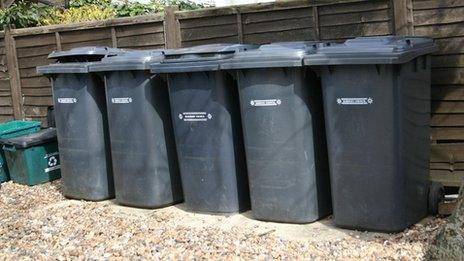
- Published17 November 2013
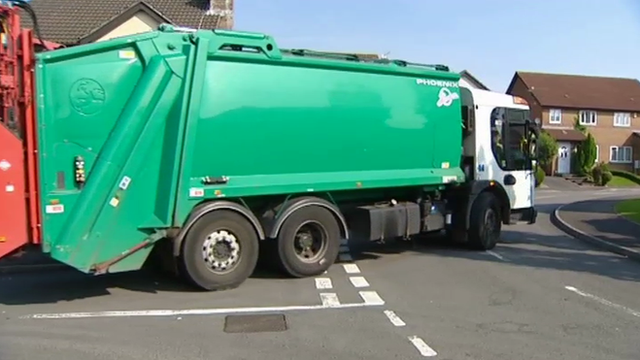
- Published7 November 2013
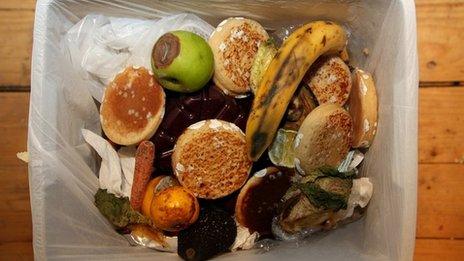
- Published27 August 2013
